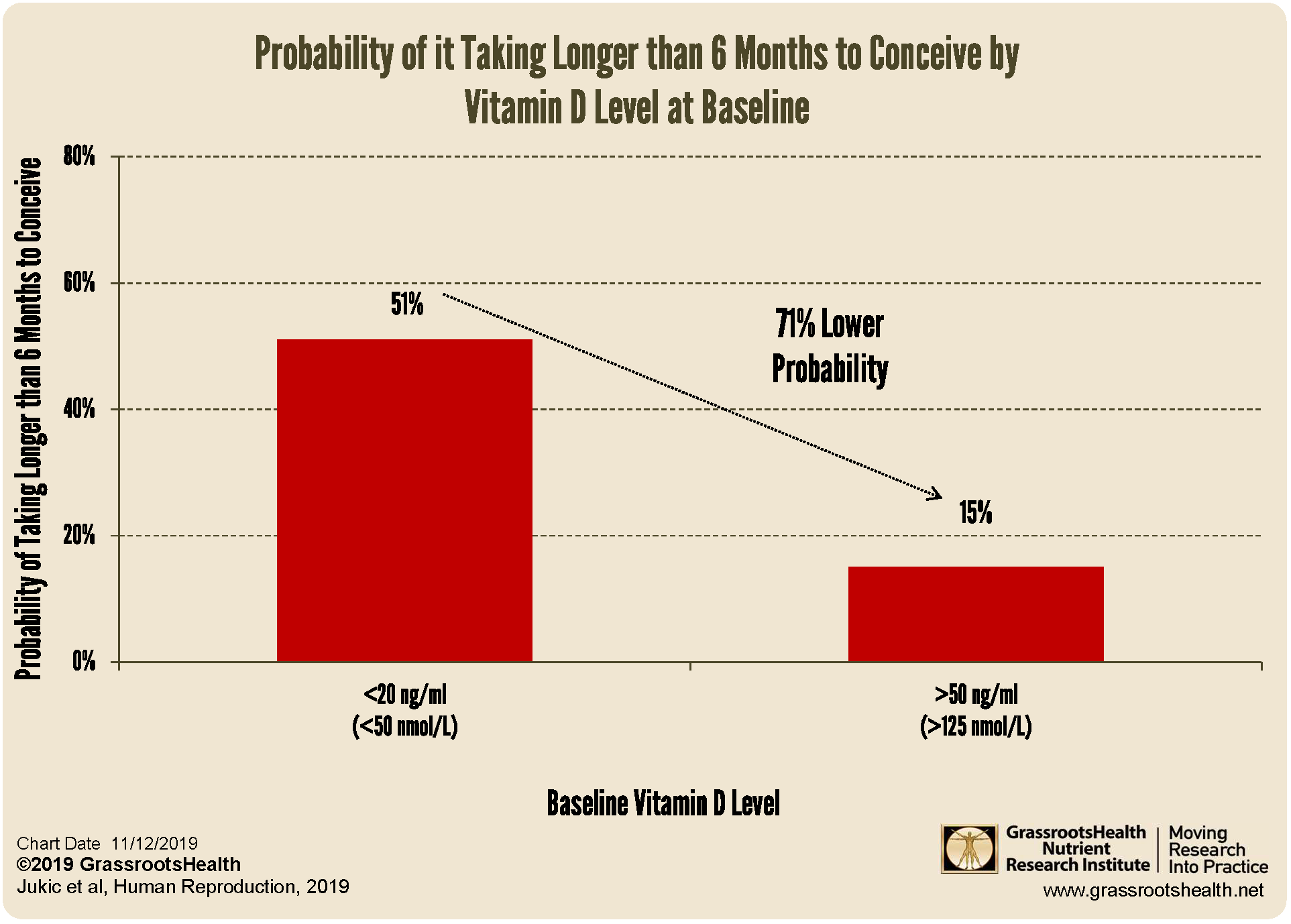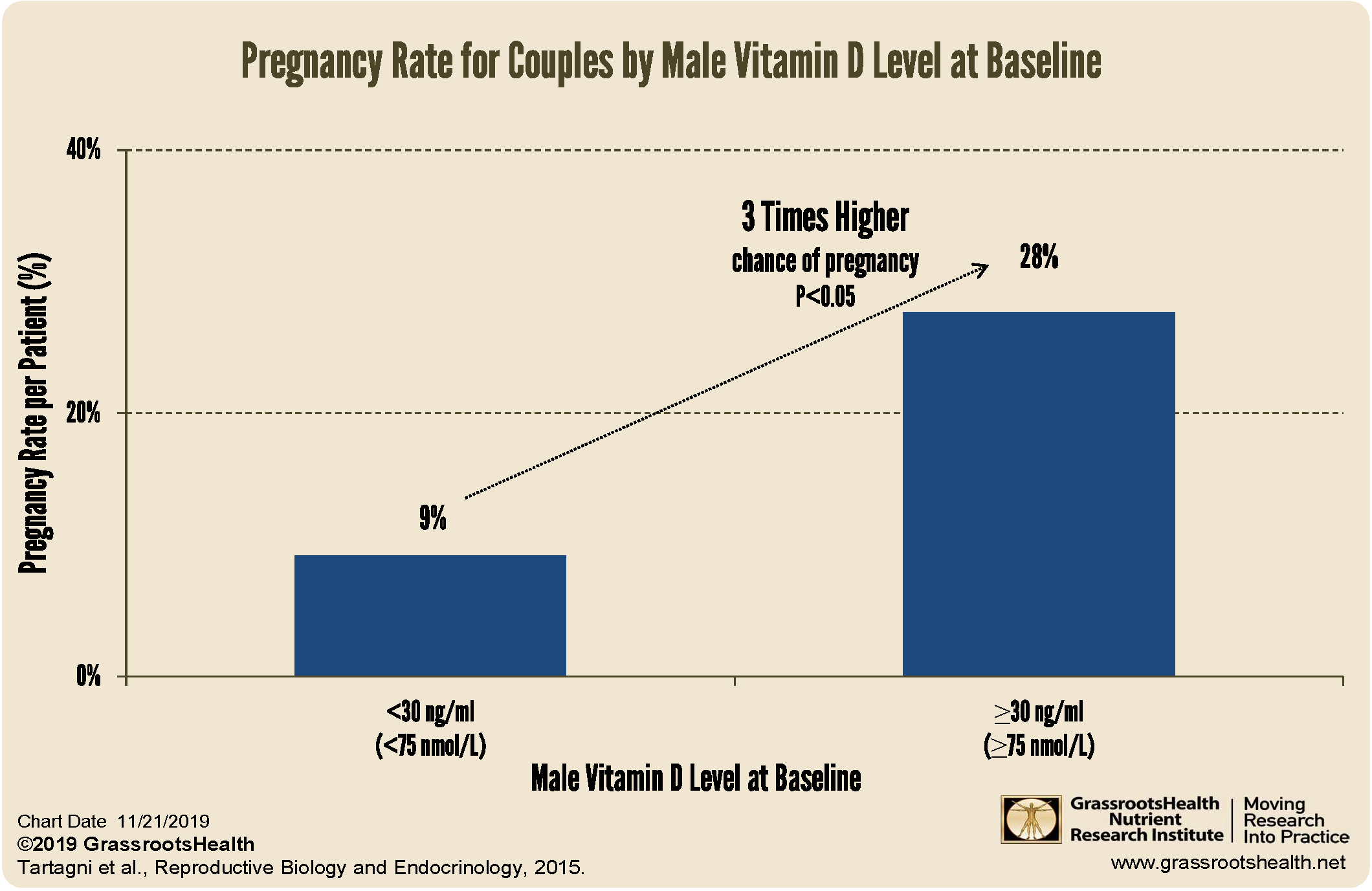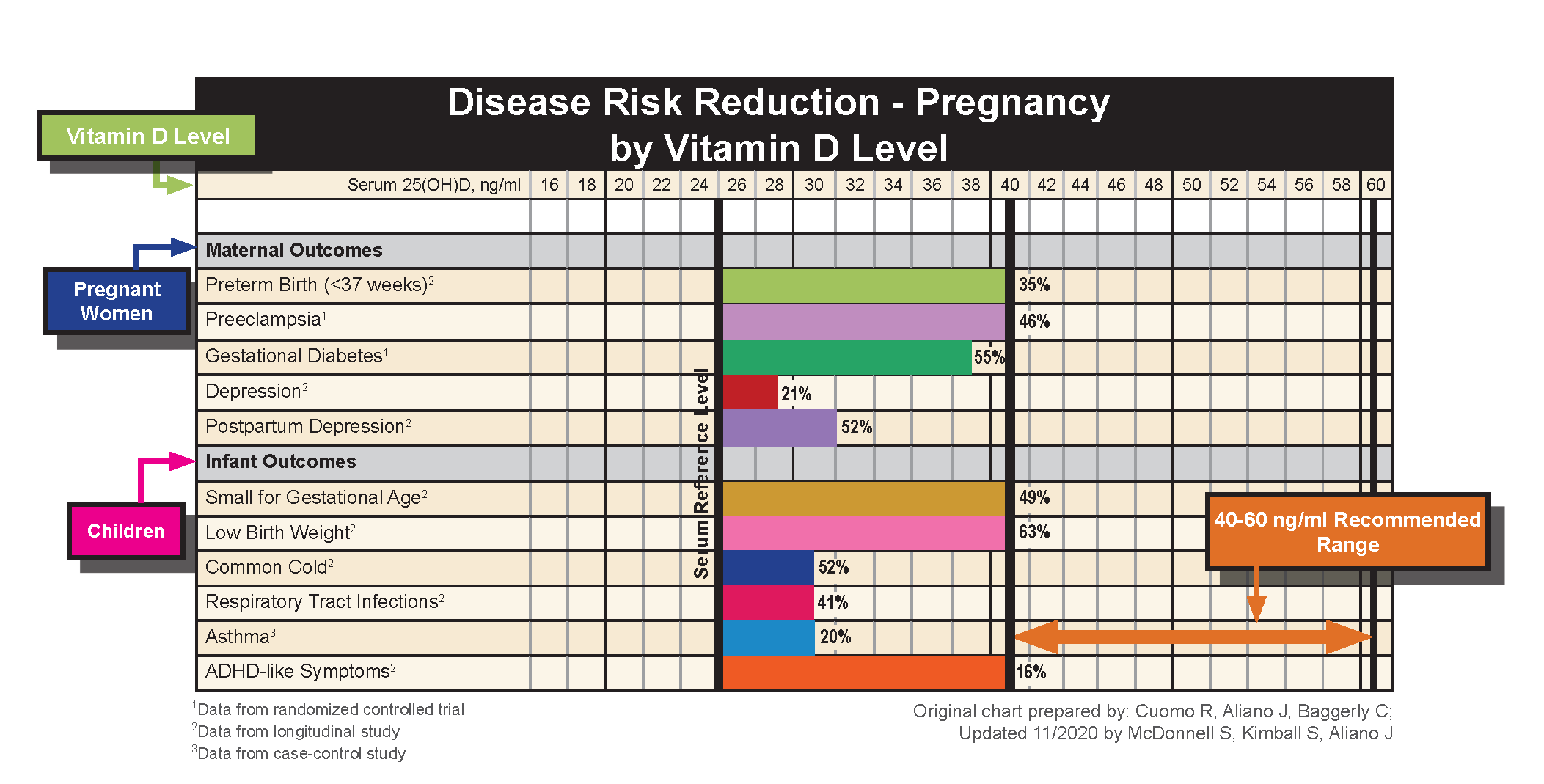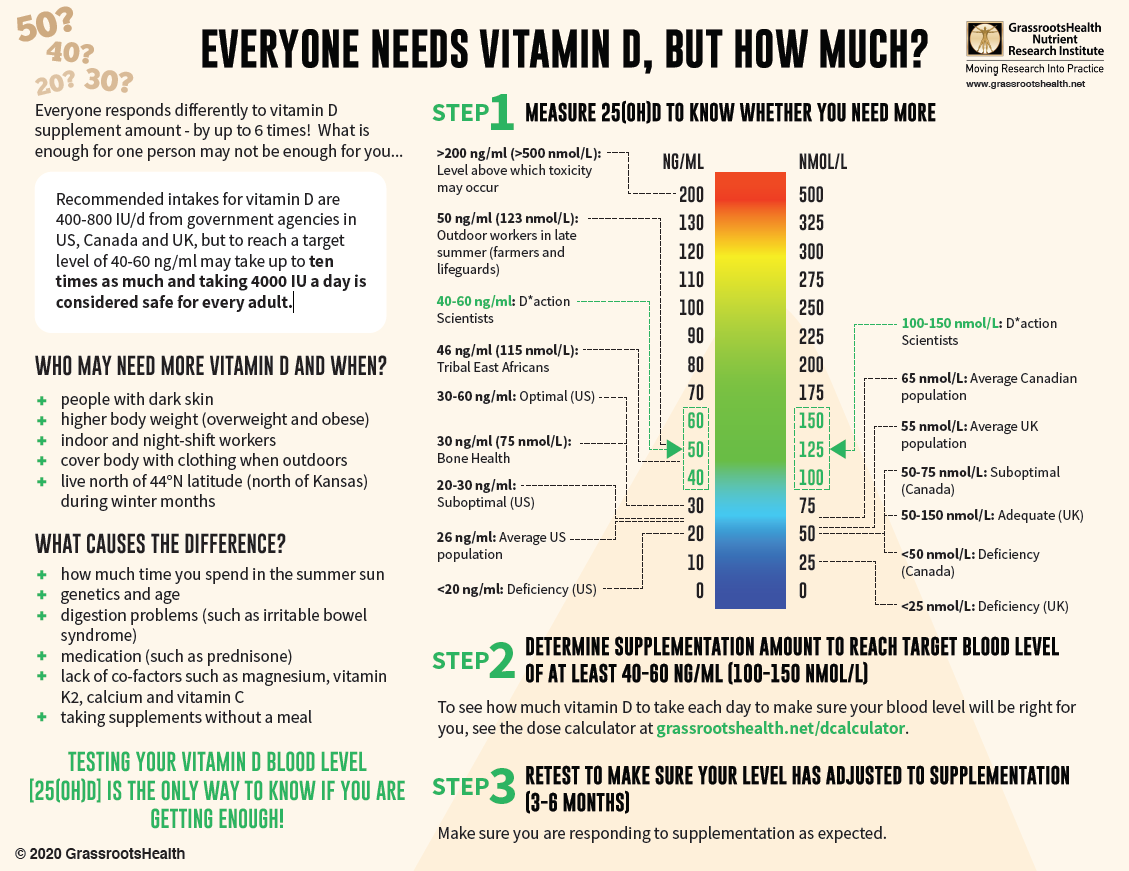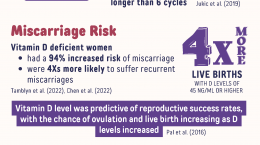Published on February 22, 2021
What is Vitamin D Good For? (Part 4: Reproductive Health) – Vitamin D is needed by virtually every cell in the body, and is essential for hundreds of processes each and every day
 In this “What is Vitamin D Good For?” series, we have discussed how vitamin D contributes to the health of multiple systems within the body and is necessary for hundreds of physiological processes throughout the day. Vitamin D acts as a protector and regulator so it is able to enhance the functioning of our cells, tissues and organs to keep us healthy. From musculoskeletal and dermatological, to cognitive and mental-emotional wellness, vitamin D has many benefits, and a deficit in vitamin D can lead to impairment or disease in each of these systems – from brittle bones to heart disease and cancer. With this in mind, why take a chance at being deficient in vitamin D?
In this “What is Vitamin D Good For?” series, we have discussed how vitamin D contributes to the health of multiple systems within the body and is necessary for hundreds of physiological processes throughout the day. Vitamin D acts as a protector and regulator so it is able to enhance the functioning of our cells, tissues and organs to keep us healthy. From musculoskeletal and dermatological, to cognitive and mental-emotional wellness, vitamin D has many benefits, and a deficit in vitamin D can lead to impairment or disease in each of these systems – from brittle bones to heart disease and cancer. With this in mind, why take a chance at being deficient in vitamin D?
Today, we take a look at why vitamin D is important to the health and function of the reproductive system, for both men and women.
From Pre-Conception to a Healthy Baby, Your Reproductive System Needs Vitamin D
Vitamin D is necessary for all stages of the life-cycle. Numerous studies have found that higher vitamin D levels during pregnancy reduce the risk of adverse maternal and infant outcomes. It is also likely that vitamin D is involved in the process of conception, implantation and the development of the placenta. In fact, vitamin D deficiency is even linked with infertility.
One example of how vitamin D levels affected conception rates among women can be seen in the chart below, which illustrates the probability of conception taking longer than six menstrual cycles among groups of varying levels of vitamin D.
Overall, women with a vitamin D level of at least 50 ng/ml (150 nmol/L) had a 71% lower probability of conception taking longer than 6 cycles compared to women whose vitamin D levels were less than 20 ng/ml (50 nmol/L).
Dads Need Vitamin D, as well as Moms!
Findings from studies such as the one illustrated in the next chart support the importance of vitamin D for male partners when it comes to increasing the chances of conception, a healthy pregnancy and baby. The pregnancy rate per patient and per cycle as well as delivery rate per patient and per cycle were all significantly higher among the couples whose male partner had a higher vitamin D level compared to the lower vitamin D.
There was also a tendency towards a higher rate of miscarriage in the group with lower male vitamin D levels, although this particular finding was not statistically significant.
Vitamin D is Especially Important for a Healthy Pregnancy
Pregnancy affects every organ system and metabolic pathway in the body. Blood volume increases, an entirely new organ is grown (the placenta), the breasts are preparing to produce milk, and a whole new person is growing and relying on mom for nutrition. Adjustments in nutrient metabolism are driven by hormonal changes and baby’s needs. It is not surprising then that alterations in vitamin D metabolism also occur. Vitamin D levels in the range of 40-60 ng/ml (100-150 nmol/L) are especially protective during pregnancy, and have been shown to reduce complications including preterm birth, hypertensive disorders of pregnancy (preeclampsia) and gestational diabetes – and is the reason for GrassrootsHealth’s Protect Our Children NOW! D*action Project. Some of the results from this project have shown that women with vitamin D levels at or above 40 ng/ml (100 nmol/L) had a 62% lower risk of preterm birth compared to women with levels less than 20 ng/ml (50 nmol/L) (p<0.0001). This lower risk remained after adjusting for socioeconomic variables.
The Pregnancy Disease Risk Reduction Chart below shows findings from other studies that have compared prenatal and newborn health outcomes to vitamin D levels. It illustrates the percent lower risk at a given vitamin D level compared to a common reference level of 25 ng/ml (62 nmol/L), which is the approximate average level of the U.S. population.
Click to Enlarge & Download (ng/ml)
Click to Enlarge & Download (nmol/L)
Bottom line: Ensuring a vitamin D level in the range of 40-60 ng/ml (100-150 nmol/L) during pregnancy is an effective way to reduce the risk of many complications for both mom and baby!
Vitamin D Levels in Pregnancy Can Affect the Future Health of the Baby
The benefits of vitamin D go well beyond pregnancy as well. Vitamin D deficiency in newborns presents an increased risk for impairment in immune function, brain development, and skeletal development, among other things. Health conditions in the child that have been associated with prenatal vitamin D deficiency include asthma, ear and lung infections, autism, type 1 diabetes and other autoimmune conditions, and an increased risk for certain cancers and cardiovascular disease later in life.
The “Barker Hypothesis,” also known as the “The Fetal Origins Hypothesis,” theorizes that certain adult-onset diseases originate from nutritional deficiencies during the perinatal period (during pregnancy or in early infancy). These damages are irreversible beyond certain critical points in development, even following full nutrient repletion. In the publication “Is Vitamin D Inadequacy in Early Life an Instance of the ‘Barker Hypothesis’?“, Dr. Robert Heaney evaluates prenatal vitamin D deficiency as part of the Barker hypothesis, and correlates it to diseases with an onset later in life such as Multiple Sclerosis (MS), Type 1 Diabetes, Preeclampsia, Schizophrenia, and other cognitive function and learning disabilities.
Summary of Overall Benefits of Vitamin D for Reproductive Health
Vitamin D functions in the reproductive system to:
- Regulate hormonal pathways, follicular development, fertility and conception time
- Important for sperm production
- Important for normal fetal development
- Essential to a healthy pregnancy, birth and baby
Reproductive Diseases associated with low vitamin D include:
- Complications and diseases in pregnancy, including Preterm Birth, Pre-eclampsia, Gestational Diabetes, inflammatory diseases in pregnancy and medically necessary Cesarean Sections
- Complications and diseases in the newborn, including rickets, impaired motor development, and even childhood cavities
- Mastitis
- Polycystic ovarian syndrome
- Fibroids and endometriosis
- Pre-eclampsia
- Bacterial vaginosis
Other Important Co-Nutrients for Reproductive Health
Don’t forget that vitamin D works along with other essential nutrients for our health. For our reproductive health, these include:
- Omega-3s for preterm birth and low birth weight, postpartum depression, and inflammation during pregnancy
- Magnesium
- B Vitamins (especially Folate)
- Iron
- Zinc
Are You Getting Enough Vitamin D to Create Healthy Babies?
With almost 90% of the general population having vitamin D levels below the recommended 40-60 ng/ml (100-150 nmol/L), it is obvious that most people need more vitamin D. While most of us cannot achieve a vitamin D level of 40-60 ng/ml from sun alone, either due to our lifestyle, where we live, or other circumstances, we can certainly reach those levels with the right amount of supplementation.
Below is a guide for how much you might need, and who may need more. Your levels can be tested safely at home – order your home test kit today.
By joining the GrassrootsHealth projects, you are not only contributing valuable information to our study, but you are also gaining knowledge about how you could improve your own health through measuring and tracking your nutrient status, and educating yourself on how to improve it. Do you know what your status of vitamin D, omega-3s, and other essential nutrients is? Could your levels be improved? Test now to find out!


